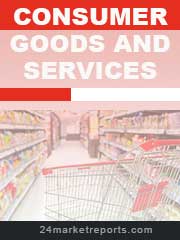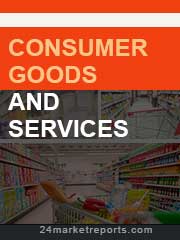
Download FREE Report Sample
Download Free sample
MARKET INSIGHTS
Global Wrap Around Label Films market was valued at USD 3,196 million in 2024 and is projected to reach USD 4,881 million by 2032, exhibiting a CAGR of 6.4% during the forecast period. The U.S. currently represents one of the largest markets, while China is anticipated to show significant growth potential.
Wrap around labels are adhesive-free films that completely encircle a product, with only the ends secured together for stability. This labeling solution offers 360-degree branding space and enhanced shelf appeal while maintaining cost-efficiency compared to traditional labeling methods. The technology is particularly prevalent in food & beverage applications, accounting for approximately 42% of market share in 2024 according to industry benchmarks.
Market growth is being driven by increasing demand for sustainable packaging solutions and advancements in film printing technologies. Polyethylene (PE) remains the dominant material segment due to its versatility and recyclability, though polyethylene terephthalate (PET) is gaining traction for premium applications. Leading manufacturers like Mondi Group and Avery Dennison are investing in thinner, stronger films to meet evolving sustainability requirements while maintaining product integrity.
Rising Demand for Sustainable Packaging Solutions Accelerates Market Growth
The global shift toward sustainable packaging is a key driver for wrap around label films, with environmental regulations pushing brands to adopt recyclable and biodegradable materials. The flexible packaging industry is witnessing over 4-5% annual growth in sustainable solutions, with wrap around labels gaining traction due to their compatibility with eco-friendly materials like BOPP and PET. Major consumer brands are reformulating packaging strategies to meet the European Union's target of making all packaging recyclable by 2030. This transition creates significant demand for advanced wrap around films that maintain performance while reducing environmental impact.
Expansion of Food & Beverage Sector Fuels Adoption Rates
To know more about market statistics, Download a FREE Sample copy
The food and beverage industry, accounting for nearly 42% of wrap around label film applications, continues to drive market expansion. Increased consumption of packaged foods, projected to grow at 5.8% CAGR globally through 2027, creates sustained demand for high-performance labeling solutions. Wrap around films offer superior moisture resistance and durability compared to paper labels - critical attributes for products like bottled beverages and frozen foods. Recent innovations in high-clarity films enable enhanced shelf appeal, while specialized barrier coatings extend product shelf life by 15-20%, creating compelling value propositions for manufacturers.
Moreover, the pharmaceutical sector's growing need for tamper-evident packaging presents additional growth avenues. Anti-counterfeiting features incorporated into wrap around labels help combat the $200 billion global counterfeit drug market while meeting stringent regulatory requirements.
Fluctuating Raw Material Prices Create Margin Pressures
The wrap around label film market faces significant volatility in polymer feedstock costs, with crude oil price swings directly impacting production economics. Polypropylene resin prices have shown 18-22% annual fluctuations since 2020, forcing manufacturers to either absorb costs or risk customer attrition through frequent price adjustments. This unpredictability particularly affects small and mid-sized producers lacking long-term supply contracts or hedging strategies. While larger players maintain some pricing power through scale advantages, the entire value chain remains vulnerable to petroleum market dynamics and geopolitical factors affecting raw material availability.
Equipment Compatibility Issues Slow Adoption Rates
Many packaging facilities still utilize legacy labeling equipment designed for paper-based solutions, creating integration challenges for film-based wrap around labels. The conversion costs for upgrading machinery can reach $150,000-$500,000 per production line - a substantial barrier for small manufacturers. Additionally, film labels require precise tension control and specialized application systems that may not be compatible with older equipment. While modern facilities increasingly adopt film-compatible machinery from installation, the installed base of conventional equipment continues to limit market penetration opportunities in certain segments.
Smart and Interactive Labeling Technologies Open New Revenue Streams
The integration of NFC and RFID technologies into wrap around films presents a high-growth opportunity, with the smart packaging market projected to exceed $45 billion by 2027. These solutions enable brands to implement product authentication, consumer engagement features, and supply chain tracking while maintaining conventional labeling functionality. Recent advancements in printable electronics allow conductive inks to be directly applied to BOPP films, creating cost-effective smart label solutions. Luxury goods, premium beverages, and pharmaceutical companies are early adopters of these hybrid technologies that combine security with digital marketing capabilities.
Emerging Markets Offer Significant Untapped Potential
Developing economies in Asia and Latin America present substantial growth opportunities as local packaging standards evolve to match global best practices. The Asia-Pacific region alone is expected to account for over 60% of new demand through 2032, driven by urbanization and expanding middle-class populations. Local manufacturers are investing in regional production facilities to serve these markets, with China and India becoming major hubs for cost-competitive wrap around film production. The ability to offer tailored solutions for regional preferences - such as humidity-resistant formulations for tropical climates - can provide competitive advantages in these high-growth markets.
Recycling Infrastructure Gaps Limit Sustainability Progress
While wrap around films are technically recyclable, inconsistent collection and sorting systems create real-world recycling challenges. Only about 14% of plastic packaging currently enters recycling streams effectively, with multilayer films facing particular processing difficulties. This disconnect between material recyclability and actual recycling rates may lead to regulatory restrictions in certain jurisdictions, potentially limiting market growth. Companies must invest in mono-material solutions and work with waste management partners to improve recovery rates, but these initiatives require significant coordination across the value chain.
Competition from Alternative Labeling Technologies Intensifies
The wrap around label film market faces growing competition from alternative technologies like sleeve labels and in-mold labeling. Pressure-sensitive labels continue to dominate certain segments where quick application and design flexibility are prioritized. Each technology has distinct advantages - while wrap around films offer cost efficiency for high-speed applications, they struggle to match the contour-hugging capabilities of sleeve labels for complex container shapes. Manufacturers must continuously innovate to maintain competitive differentiation through enhanced printing quality, application efficiency, and sustainability credentials.
Polyethylene (PE) Segment Dominates Due to Cost-Effectiveness and High Durability
The market is segmented based on type into:
Polyethylene (PE)
Subtypes: Low-Density PE, High-Density PE, Linear Low-Density PE
Polyethylene Terephthalate (PET)
Polypropylene (PP)
Biaxial Oriented Polypropylene (BOPP)
Cast Propylene (CPP)
Others
Food & Beverages Segment Leads Due to Rising Demand for Product Differentiation
The market is segmented based on application into:
Food & Beverages
Homecare
Pharmaceuticals
Personal Care & Cosmetics
Others
Medium Thickness Films (30-60 microns) Preferred for Balanced Performance
The market is segmented based on material thickness into:
Thin Films (Below 30 microns)
Medium Thickness Films (30-60 microns)
Thick Films (Above 60 microns)
Flexographic Printing Dominates Due to High-Speed Production Capabilities
The market is segmented based on printing technology into:
Flexographic Printing
Digital Printing
Offset Printing
Gravure Printing
Market Leaders Drive Innovation Through Sustainable Packaging Solutions
The global wrap around label films market features a semi-consolidated competitive landscape, with established multinational corporations competing alongside regional specialists. Mondi Group plc currently leads the market, leveraging its extensive production capabilities and sustainable film solutions that cater to diverse end-use industries. The company's strength lies in its vertically integrated operations and strong distribution network across Europe and North America.
Irplast S.p.A. and HERMA GmbH have emerged as significant competitors, particularly in the European market, where they command notable market shares in the food & beverages and personal care segments. These companies differentiate themselves through proprietary adhesive technologies and customized printing solutions that enhance label performance on various container types.
Market competition has intensified as manufacturers focus on developing eco-friendly alternatives to conventional plastic films. Several players, including Avery Dennison Corp and Renolit SE, have recently introduced bio-based and recyclable film options to meet evolving sustainability requirements from brand owners. This strategic shift toward green materials is expected to redefine market dynamics in the coming years.
Meanwhile, Bischof + Klein France SAS and POLI-FILM SA are expanding their market presence through targeted acquisitions and capacity expansions in emerging Asian markets. These companies benefit from their specialized expertise in high-performance films for pharmaceutical and technical applications, creating distinct competitive advantages in niche segments.
Mondi Group plc (UK)
Irplast S.p.A. (Italy)
Invico S.A. (Poland)
Bischof + Klein France SAS (France)
SELENA S.p.A. (Italy)
HERMA GmbH (Germany)
Avery Dennison Corp (U.S.)
Dunmore Corp (U.S.)
Renolit SE (Germany)
POLI-FILM SA (Switzerland)
Accrued Plastic Ltd (UK)
Manucor S.p.A. (Italy)
The global Wrap Around Label Films market is experiencing a significant shift toward sustainable materials, driven by increasing environmental consciousness among both manufacturers and consumers. Polyethylene (PE) and Polyethylene Terephthalate (PET) films, which currently dominate the market, are being gradually complemented or replaced by biodegradable and recyclable alternatives. In 2024, nearly 42% of new product launches in this sector incorporated sustainability claims, reflecting tightening regulations and shifting consumer preferences. Innovations in bio-based polymers and thinner film technologies are further enhancing the eco-friendly appeal of wrap around labels while maintaining their durability and printability. Major brands across food & beverage and personal care sectors are actively redesigning packaging to align with circular economy principles.
Digital Printing Advancements
The adoption of digital printing technologies is revolutionizing wrap around label production, enabling shorter runs, faster turnaround times, and greater design flexibility. High-resolution digital presses now account for over 28% of label film printing applications, with adoption rates growing at double-digit annual rates. This trend is particularly prominent in the personal care and premium beverage segments where brands demand photorealistic graphics, variable data printing, and frequent design changes. The elimination of printing plates and reduced setup waste makes digital printing increasingly cost-effective for medium-volume orders.
The explosive growth of e-commerce has created new demands for wrap around label films that can withstand rigorous shipping conditions while maintaining visual appeal. Nearly 65% of logistics-oriented label film innovations in 2024 focused on enhancing tear resistance and scuff protection. Manufacturers are developing specialized films with higher tensile strength and improved adhesion properties to prevent label damage during transit. Furthermore, the integration of smart labeling features such as QR codes and NFC tags into wrap around films is gaining traction, enabling brands to enhance customer engagement and supply chain visibility. The pharmaceutical sector in particular is leveraging these technologies for anti-counterfeiting measures and patient information access.
North America
The North American wrap around label films market is characterized by a strong emphasis on sustainability and compliance with strict regulatory standards. The U.S. leads the region, driven by robust demand from the food & beverages and pharmaceutical sectors, where product differentiation and labeling clarity are paramount. The shift toward recyclable and biodegradable films, particularly polyethylene (PE) and polyethylene terephthalate (PET) variants, is accelerated by environmental policies and consumer awareness. Canada follows closely with increasing adoption in the personal care & cosmetics industry, while Mexico shows steady growth due to expanding domestic manufacturing capabilities.
Europe
Europe’s market is shaped by stringent EU regulations on packaging waste, fostering innovation in sustainable label solutions. Countries like Germany and France are frontrunners in adopting bio-based and compostable films, supported by government incentives for eco-friendly materials. The U.K. remains a key player due to its thriving beverage sector, where high-quality labeling is essential for brand positioning. Despite economic uncertainties, the region continues to prioritize circular economy principles, driving demand for mono-material films like BOPP and PP that align with recycling goals.
Asia-Pacific
As the largest and fastest-growing market, Asia-Pacific is fueled by China, India, and Southeast Asia, where rapid urbanization and booming e-commerce drive demand for cost-effective labeling solutions. China dominates production, leveraging its PET and BOPP film manufacturing capabilities, while India sees rising adoption in FMCG sectors due to increased consumer spending. However, the region remains price-sensitive, with conventional films still prevalent. Japan and South Korea stand out with a focus on high-barrier films for pharmaceuticals and premium beverages, reflecting their advanced packaging standards.
South America
The South American market is nascent but evolving, with Brazil leading due to its strong food processing and cosmetics industries. Economic instability and limited recycling infrastructure hinder widespread adoption of advanced films, though multinational brands are gradually pushing for sustainable alternatives. Argentina shows potential in agricultural product labeling, but currency fluctuations and import dependencies pose challenges. The region’s growth is further tempered by low regulatory pressure compared to North America or Europe.
Middle East & Africa
Growth in this region is uneven but promising, with the UAE, Saudi Arabia, and South Africa emerging as key markets. The food and beverage sector drives demand, supported by tourism and retail expansion. However, limited local production means heavy reliance on imports, increasing costs. While sustainability awareness is rising, traditional PP and PE films dominate due to affordability. Long-term opportunities lie in infrastructure development and urbanization, though progress is slow in underdeveloped regions.
This market research report offers a holistic overview of global and regional markets for the forecast period 2025–2032. It presents accurate and actionable insights based on a blend of primary and secondary research.
✅ Market Overview
Global and regional market size (historical & forecast)
Growth trends and value/volume projections
✅ Segmentation Analysis
By product type or category
By application or usage area
By end-user industry
By distribution channel (if applicable)
✅ Regional Insights
North America, Europe, Asia-Pacific, Latin America, Middle East & Africa
Country-level data for key markets
✅ Competitive Landscape
Company profiles and market share analysis
Key strategies: M&A, partnerships, expansions
Product portfolio and pricing strategies
✅ Technology & Innovation
Emerging technologies and R&D trends
Automation, digitalization, sustainability initiatives
Impact of AI, IoT, or other disruptors (where applicable)
✅ Market Dynamics
Key drivers supporting market growth
Restraints and potential risk factors
Supply chain trends and challenges
✅ Opportunities & Recommendations
High-growth segments
Investment hotspots
Strategic suggestions for stakeholders
✅ Stakeholder Insights
Target audience includes manufacturers, suppliers, distributors, investors, regulators, and policymakers
-> Key players include Mondi Group plc, Irplast S.p.A., Invico S.A., Bischof + Klein France SAS, SELENA S.p.A., HERMA GmbH, Avery Dennison Corp, Dunmore Corp, Renolit SE, and POLI-FILM SA, among others. The top five players held a significant market share in 2024.
-> Key growth drivers include rising demand for sustainable packaging, increased adoption in food & beverage industries, and advancements in labeling technologies.
-> Asia-Pacific is the fastest-growing region due to expanding manufacturing sectors, while Europe and North America maintain strong market positions.
-> Emerging trends include eco-friendly film materials, smart labeling solutions, and high-performance barrier films for enhanced product protection.

Speak to our Custom Research Team and get the Custom Research in a budget
Custom ResearchFrequently Asked Questions ?
A license granted to one user. Rules or conditions might be applied for e.g. the use of electric files (PDFs) or printings, depending on product.
A license granted to multiple users.
A license granted to a single business site/establishment.
A license granted to all employees within organisation access to the product.
Upto Working 24 to 48 hrs
Upto 72 hrs max - Weekends and Public Holidays
Online Payments with PayPal and CCavenue
Wire Transfer/Bank Transfer
Hard Copy



 Industry Market Size
Industry Market Size SWOT Analysis
SWOT Analysis Industry Major Players
Industry Major Players Revenue Forecasts
Revenue Forecasts Historical and Forecast Growth
Historical and Forecast Growth Profitability Analysis
Profitability Analysis
























